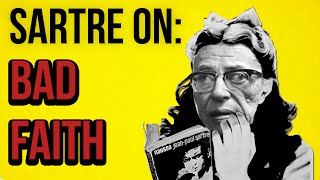In being and nothingness written in 1943 the French existentialist philosopher Jean-Paul Sartre identified a problem which he believed plagued modern life.
法国存在主义哲学家沙特在1943年的《存在与虚无》中指出了他认为残害了当代生活的一个问题。
Mauvaise Foi, literally "bad faith".
也就是Mauvaise Foi,坏的信念(自欺)
Bad faith occurs when we lie to ourselves in order to spare ourselves short term pain, but thereby suffer from long term psychological impoverishment.
坏的信念会在我们为了克服一时的痛苦而自欺时出现,却因此造成我们心理长期的匮乏状态。
We force ourselves to believe something which we're not really convinced by, because it's easier.
只因为这么做比较轻松,我们便强迫自己相信一些我们并不真正相信的事情。
In particular, Sartre believe that what we constantly lie to ourselves about is that we don't have other options.
其中,沙特认为我们经常对没有其他选择的事自欺。
We always do, but find it curiously more reassuring to say we don't. It lets us off the hook.
我们总是有选择的,但却发现说自己没有选择感觉特别安心,因为那可以让我们脱身。
Bad faith often happens around work.
坏的信念常出现在工作中。
Sartre describes a waiter who tells himself he's just a waiter. It's his lot in life, his destiny.
沙特描写了一个告诉自己“他只是个服务生,这就是他的命运”的服务生。
He tells himself that he had no choice, that he has to keep on at it because he needs the money.
服务生告诉自己别无选择,必须为了赚钱坚持下去。
But it's not true, insists Sartre, we are all free.
但这并不是真的,沙特坚称我们是自由的。
There are scary, almost sickening moments of what Sartre calls Negative Ecstasy, which might come late at night, when we realize that we are in fact far more free than we ever say we are.
沙特把一种恐怖的、令人难受的状态称为负性狂喜,它可能出现在深夜。此时,我们领悟到自己比我们说的更自由。
That we could throw in the job, go and live in the woods, or reinvent ourselves.
我们发现自己可以丢下工作,搬到森林里过活,或是重新创造自我。
It can be harrowing, because we have to acknowledge that we may be wasting our lives and that in the end this is our own fault, however much at other times we are tempted to blame circumstances or other people.
这可能让我们十分难过,因为我们发现自己可能在浪费生命,而且那完全是自己的错。无论我们平常多爱把错怪在环境或别人头上都一样。
But we then typically suppress this insight. The next day we force ourselves to believe in what we're doing.
但我们通常会压抑这种洞见,隔天醒来还是强迫自己回到之前的生活。

The price is that we close off the opportunities for changing and improving our lives
这样做的代价是我们关上了改变和提升生活的机会
We forget, Sartre Says, that 'Being precedes essence'
我们忘了,沙特所说的“存在先于本质”。
That is, who we are can't be pinned down to one particular job or relationship.
也就是说我们是什么人,并不能用一件工作或关系下定论。
Our being is much bigger.
我们的存在是更广大的。
It embraces in Sartre's words "all the things we are at present not, but could possibly become".
以沙特的话来说是,“一切我们现在不是,但有可能成为的事物”。
In bad faith we keep those possibilities out of our minds, we tell ourselves that the way we are at the moment is the only way we can be, so bad faith closes down on the options of freedom.
坏的信念让我们排除了那些可能性,我们告诉自己,我们只能是现在的样子,也就是说坏的信念关上了我们选择的自由。
Sartre detected bad faith as a feature of many unhappy relationships.
沙特发现,坏的信念是许多不愉快感情的特征。
He describes its origins in early dates when a couple secretly realise that they are not at all compatible, but then force themselves to believe that they can be happy together.
比如在感情刚开始时,就暗中发现彼此不合适的一对情侣,却强迫彼此相信他们可以愉快的交往。
In Sartre's example, a woman wants to be loved for her mind and can't bear to pay attention to her own dark suspicion that her partner is in fact more interested in her body.
在沙特的例子中,一位女子希望因自己的内在而被爱,因此难以忍受自己心中的疑虑,即她的伴侣实际上对她的身体更感兴趣。
Meanwhile the man realises that the woman isn't interested in him sexually, but keeps telling himself that "really she must be".
而男方虽然发现了女方对他没有性趣,却不断告诉自己她一定对我有性趣。
They both lie to themselves and that's why they end up together and unhappy.
他们两人都在欺骗自己,也因此在一起而不快乐。
Bad faith will lead them to throw the blame on each other saying it's the other's coldness or lack of sophistication that's the problem, when really it's their own doing.
坏的信念会让他们责怪对方,说问题都是因为对方的冷淡或缺乏教养,但其实一切都是自作自受。
Sartre didn't see bad faith as a surprising or unusual problem. It's a natural outcome of how our minds work.
沙特不认为坏的信念是种奇特或不正常的问题,它其实是我们心智活动的一种自然结果。
He didn't want us to feel bad. He just wanted to remind us to be as free as we really are.
他并不是想让我们难过,而是想提醒我们,要让自己像我们该有的样子那样自由。











